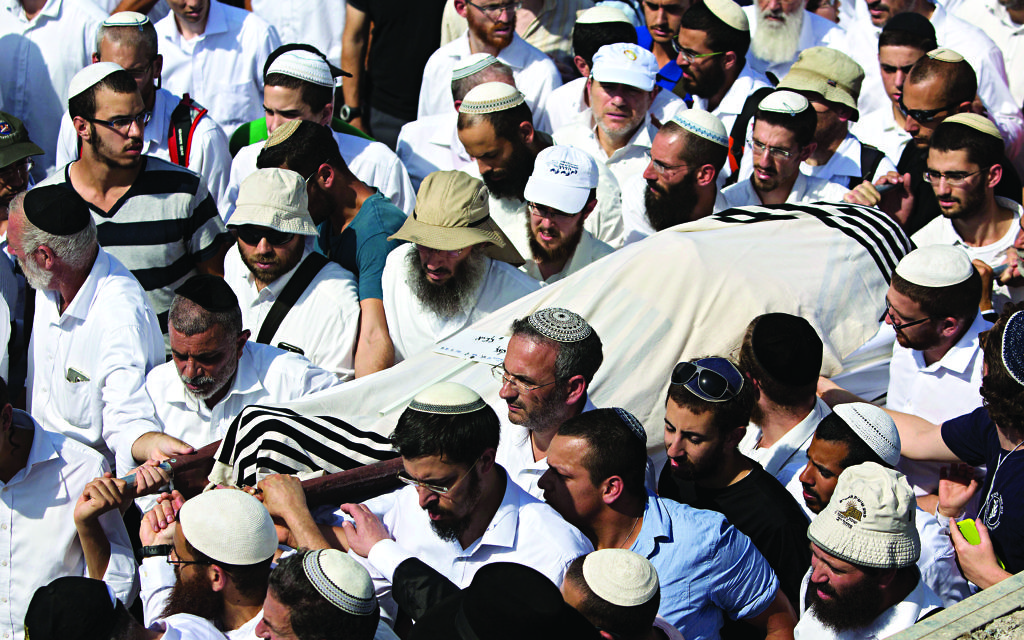OPINION: Bloodshed fills the diplomatic vacuum


By James Sorene Chief Executive, BICOM (Britain Israel Communication and Research centre)
Are we in the midst of a Third Intifada? After years of security cooperation between Israel and the Palestinian Authority a series of violent attacks has swept across East Jerusalem and the West Bank. This is characterised by ‘lone wolf’ stabbings, rock and Molotov Cocktail throwing and shootings. It looks spontaneous, but to what extent is it being encouraged?
Palestinian support for violence has spiked in recent weeks, driven by the mistaken belief that Israel intends to change the status quo on the Temple Mount in Jerusalem – stirred up by Islamist incitement, and unhelpful activity and rhetoric by the Israeli far-right.
Get The Jewish News Daily Edition by email and never miss our top stories Free Sign Up
The context however, is a diplomatic vacuum and the limbo it leaves, not least in East Jerusalem. Mahmoud Abbas has never seemed interested in negotiating with Netanyahu. He has for years been declaring negotiations a ‘failure,’ instead pursuing unilateral recognition internationally, while encouraging unarmed ‘popular resistance’.
But Netanyahu had only last week reiterated his call at the UN for direct talks without preconditions. Abbas is playing a dangerous game. Confronting Israel is vital to boost his waning legitimacy. But he cooperates with Israel against the common foe, Hamas. The Islamist group, not yet ready to fight another conflict from Gaza, seeks unrest in the West Bank and East Jerusalem to undermine Israel, weaken Abbas and expose him as a collaborator.
Hence Abbas praises the ‘resistance’ and renounces the Oslo framework while simultaneously allowing his security forces to work closely with Israel.
In this respect the situation is different from the First Intifada, where no Palestinian leaders were able to restore calm and the Second Intifada, in which Arafat sought to lead the escalating conflict with devastating consequences.
In Israel, Netanyahu is caught between the desire to avoid escalation and the need to look tough and deter further attacks, with right-wing coalition partners seeking to outflank him.
The shared interest of Netanyahu and Abbas may help prevent a full-scale conflict. But given Abbas’s weakness, and the absence of a diplomatic framework, more violence is likely.
The UK and EU should urge both sides to cut the rhetoric and press Abbas to urgently re-engage in constructive bilateral talks with Israel.

Thank you for helping to make Jewish News the leading source of news and opinion for the UK Jewish community. Today we're asking for your invaluable help to continue putting our community first in everything we do.
For as little as £5 a month you can help sustain the vital work we do in celebrating and standing up for Jewish life in Britain.
Jewish News holds our community together and keeps us connected. Like a synagogue, it’s where people turn to feel part of something bigger. It also proudly shows the rest of Britain the vibrancy and rich culture of modern Jewish life.
You can make a quick and easy one-off or monthly contribution of £5, £10, £20 or any other sum you’re comfortable with.
100% of your donation will help us continue celebrating our community, in all its dynamic diversity...
Engaging
Being a community platform means so much more than producing a newspaper and website. One of our proudest roles is media partnering with our invaluable charities to amplify the outstanding work they do to help us all.
Celebrating
There’s no shortage of oys in the world but Jewish News takes every opportunity to celebrate the joys too, through projects like Night of Heroes, 40 Under 40 and other compelling countdowns that make the community kvell with pride.
Pioneering
In the first collaboration between media outlets from different faiths, Jewish News worked with British Muslim TV and Church Times to produce a list of young activists leading the way on interfaith understanding.
Campaigning
Royal Mail issued a stamp honouring Holocaust hero Sir Nicholas Winton after a Jewish News campaign attracted more than 100,000 backers. Jewish Newsalso produces special editions of the paper highlighting pressing issues including mental health and Holocaust remembrance.
Easy access
In an age when news is readily accessible, Jewish News provides high-quality content free online and offline, removing any financial barriers to connecting people.
Voice of our community to wider society
The Jewish News team regularly appears on TV, radio and on the pages of the national press to comment on stories about the Jewish community. Easy access to the paper on the streets of London also means Jewish News provides an invaluable window into the community for the country at large.
We hope you agree all this is worth preserving.
-
By Laurent Vaughan - Senior Associate (Bishop & Sewell Solicitors)
-
By Laurent Vaughan - Senior Associate (Bishop & Sewell Solicitors)
-
By Laurent Vaughan - Senior Associate (Bishop & Sewell Solicitors)
-
By Laurent Vaughan - Senior Associate (Bishop & Sewell Solicitors)





















